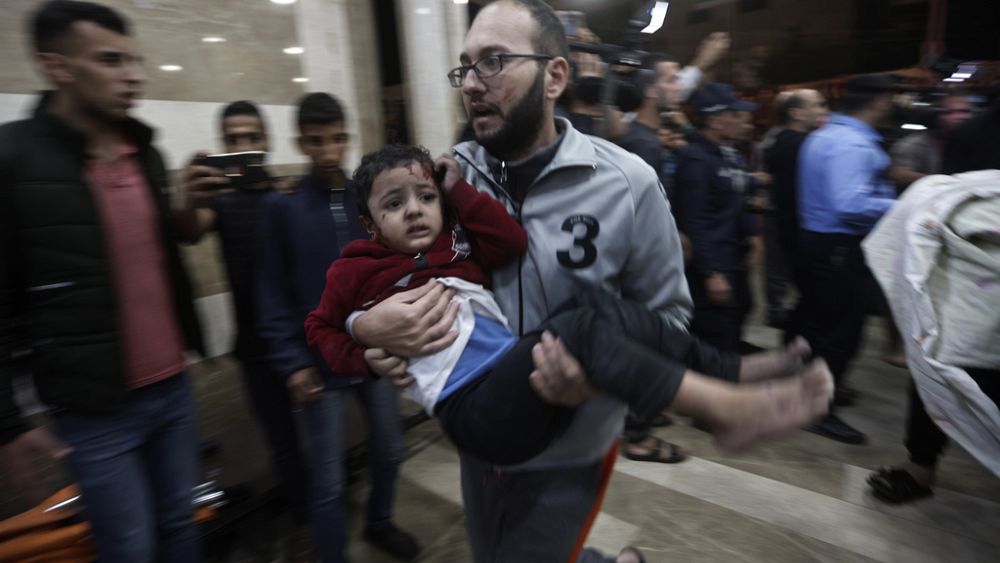
After the resumption of military operations in the Gaza Strip in the early hours of Friday, the United Nations Children’s Fund, UNICEF, called for an immediate halt of hostilities in the war-shattered Palestinian enclave, appealing to parties and states with influence to ensure a ceasefire.
“A lasting ceasefire must be implemented. The alternative is unthinkable for people who are, as a Palestinian said to me, already living in a nightmare,” said UNICEF spokesman James Elder.
He added that “inaction at its core is an approval of the killing of children. But here we are. The bombs started just a few seconds after the ceasefire.”
Citing data from the Gazan health authorities, the UN World Health Organisation (WHO) said that more than 15,000 people had died as of 27 November. Of that number 41 per cent – or 6,150 – were children.
On Saturday, the health authorities updated the figure to more than 15,200, 70 per cent of them women and children.
“It’s deeply, deeply unsettling to hear how some have been able to overlook the tragic deaths of thousands and thousands of boys and girls in Gaza and are now seemingly comfortable with the horrors, the attacks starting again. To accept the sacrifice of the children in Gaza is humanity giving up,” Mr Elder told journalists at the UN Geneva headquarters via video link from Khan Younis in the southern Gaza Strip.
Elder also reported that the conflict has created many child amputees in recent weeks. “It’s around 1,000 children (who) have had an upper or lower limb or both amputated these past weeks,” he said. “It’s callous to think that we are now to know that we are now apparently returning to that.”
WHO reported that 18 out of 36 hospitals are partially functional, and the total bed capacity in Gaza has fallen from 3,500 to only 1,562. Given the extreme needs, at least 5,000 beds are currently required.
“The Gaza health system has been crippled by the ongoing hostilities, and I want to stress that it cannot afford to lose any more hospitals or hospital beds,” said Dr Richard Peeperkorn, WHO’s representative in the Occupied Palestinian Territories. “We are extremely concerned about the resumption of violence that might have damaged or destroyed health facilities, as it did in the north”.
Speaking about the conditions there, Rob Holden, WHO’s Senior Emergency Officer, reported that “it’s like a horror movie when you walk in there, there are patients on the floor with the most traumatic injuries that you can imagine, essentially battlefield trauma…The patients are given the best possible care, but the number of staff available is relatively small. Many of the staff have fled, fled with their families or have been killed. The supplies are just not enough. There have been major problems of getting supplies to the north of Wadi Gaza.”
Echoing the call for peace, Jens Laerke, spokesman for the United Nations Office for the Coordination of Humanitarian Affairs said that “today, children, women and men in Gaza and Israel woke up to war again. Parties to this conflict must protect civilians and provide access to humanitarian actors to deliver across Gaza and according to needs as per international humanitarian law.”
He reminded that “humanitarian aid must continue unconditionally, hostages must be released unconditionally. The UN will continue to stay and deliver food, water, medical and other critical supplies to save lives.”
The week-long humanitarian pause in hostilities between Hamas militants and Israeli forces allowed the delivery of desperately needed fuel, food and water, which people have been drinking as soon as it is given to them, humanitarians report.
The pause also enabled the release of hostages taken during the 7 October surprise attack by Hamas on southern Israel and the ensuing massacre of some 1,200 people, and the freeing of Palestinian prisoners held in Israel.
“With the resumption of war, of course, we fear that the continuation of this is now in doubt. So, we need a resumption of a pause and not a return to war,” said Laerke.
Ravina Shamdasani, spokesperson for the UN Human Rights Office emphasised that “under international humanitarian law, Israel has an obligation to respect the principles of distinction, proportionality and precaution and attack, and to ensure the protection of civilians. “
Shamdasani added that “even if there are reports or allegations that other armed actors that Palestinian armed groups are locating military objectives in certain facilities, it still does not absolve the other side of their responsibility to protect civilians.”
On Thursday the US Secretary of State Antony Blinken said that Israel had agreed to formulate a “clear plan” to reduce the number of civilian deaths before resuming its assault on Gaza.





